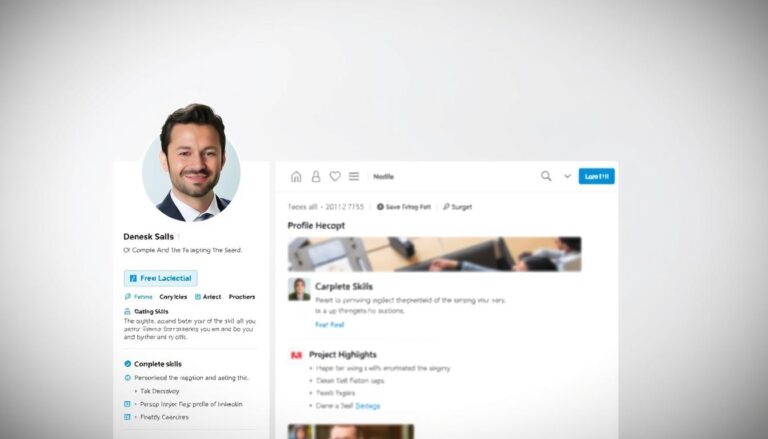How to Find a Mentor in Your Industry
Having mentorship in the early years of your career can be incredibly valuable. It helps you learn from other people’s experiences and gain new perspectives that can shape your career.
A mentor provides guidance, advice, and support, helping you navigate your chosen industry. With their industry expertise, they can offer insights that are not readily available elsewhere.
Finding the right mentor can be a game-changer for your career development. It’s about connecting with someone who understands your goals and can provide the right guidance to achieve them.
The Value of Mentorship in Career Development
Mentorship is a powerful tool for career development, providing benefits that can last a lifetime. Having a mentor can help you navigate professional life, learn from their experience, and gain new perspectives.
Guidance and Advice
One of the primary mentorship benefits is the guidance and advice you receive from your mentor. They can offer valuable insights into your industry, helping you make informed decisions about your career path. With their experience, you can avoid common pitfalls and stay on track to achieving your professional goals.

A mentor provides career guidance by sharing their knowledge and expertise. This guidance can be instrumental in helping you overcome challenges and capitalize on opportunities. Moreover, a mentor can offer professional advice tailored to your needs, helping you grow both personally and professionally.
By leveraging the guidance and advice of a mentor, you can enhance your career prospects and achieve a more fulfilling professional life. The mentorship relationship is a two-way street, where both the mentor and mentee can learn and grow together.
Identifying Your Mentorship Needs
The journey to finding the right mentor begins with a clear understanding of your mentorship needs and career aspirations. To achieve this, you must first identify your personal and professional goals.
Clarifying your objectives is essential to determining the kind of guidance you require from a mentor. Consider what you hope to achieve through the mentorship, whether it’s advancing in your current career path, transitioning to a new field, or developing specific skills.

Understanding your career goals and personal development aspirations will help you identify the type of mentor who can best support you. Reflect on your strengths, weaknesses, and areas where you need improvement.
By clearly defining your mentorship needs, you can focus your search on finding a mentor with the expertise and experience that aligns with your objectives, ensuring a productive and beneficial mentorship experience.
How to Find a Mentor in Your Industry
Finding a mentor in your industry can be a game-changer for your career. It involves strategic networking and a clear understanding of what you’re looking for in a mentorship.
To start, identify your mentorship needs. What specific areas of your career or industry do you need guidance on? This clarity will help you target the right professionals.
Professional networking is a crucial step. Attend industry events, join professional organizations, and engage with online communities related to your field. These platforms provide opportunities to meet experienced professionals who can offer valuable insights.

Researching potential mentors is also vital. Look for individuals with industry expertise and a track record of success. Review their work, understand their achievements, and assess how their experience aligns with your needs.
When seeking out a mentor, be clear about your goals and what you hope to achieve from the mentorship. This clarity will not only help you find the right mentor but also make the mentorship more productive.
By combining strategic networking, clear goal-setting, and thorough research, you can find a mentor who provides the guidance and support needed to excel in your industry.
Approaching Potential Mentors Effectively
Effectively approaching a potential mentor requires a strategic and respectful communication plan. When you’re reaching out to someone you admire or who is experienced in your desired field, it’s crucial to make a good impression.
To start, your mentorship request should be clear and concise. Begin by introducing yourself, explaining how you came across their work, and why you’re interested in their guidance. Be specific about what you’re hoping to achieve from the mentorship, whether it’s career advice, industry insights, or skill development.

Professional communication is key throughout this process. Ensure your message is well-written, free of typos, and respectful of the potential mentor’s time. If you’re reaching out via email, use a clear subject line that indicates your intention, such as “Request for Mentorship Guidance.”
Being prepared also means doing your homework on the potential mentor. Understand their work, achievements, and any challenges they’ve faced. This not only shows your genuine interest but also helps you tailor your request to their expertise.
In conclusion, approaching potential mentors effectively is about being clear, respectful, and prepared. By crafting a thoughtful mentorship request and communicating professionally, you significantly increase your chances of securing a valuable mentorship.
Building a Productive Mentorship Relationship
Mutual respect and trust are the cornerstones of a productive mentorship. When both parties feel valued and respected, the relationship flourishes, leading to a more effective exchange of guidance and support.
Clear communication is also vital. It ensures that both the mentor and mentee are on the same page, working towards common goals. Regular check-ins and open dialogue help to foster a deeper understanding and facilitate progress.
To build trust, mentors and mentees should establish clear expectations and boundaries from the outset. This foundation allows for a more honest and productive relationship, where both parties feel comfortable sharing their thoughts and challenges.
Mutual respect is equally important, as it creates a positive and supportive environment. By valuing each other’s time and insights, mentors and mentees can work together more effectively, leading to greater career satisfaction and growth.
In summary, a productive mentorship is built on a foundation of mutual respect, trust, and clear communication. By focusing on these elements, individuals can create a supportive and beneficial relationship that fosters career development and personal growth.
Overcoming Common Mentorship Challenges
To maximize the benefits of mentorship, it’s essential to address the common hurdles that mentees and mentors face. Mentorship Challenges can arise from various sources, including communication breakdowns, mismatched expectations, and difficulties in establishing a productive relationship.
Effective communication is the cornerstone of overcoming these obstacles. Regular check-ins and open dialogue can help clarify expectations and resolve issues promptly. By being proactive and addressing problems as they arise, both parties can work together to find solutions, fostering a more productive and satisfying mentorship experience.
Overcoming Obstacles requires flexibility and a willingness to adapt. As circumstances change, the mentorship relationship may need to evolve. This could involve adjusting the frequency of meetings, the focus of the mentorship, or the methods of communication. By being flexible, mentors and mentees can navigate challenges more effectively.
Ultimately, Problem-Solving is a collaborative effort. By working together and maintaining a positive, solution-focused attitude, mentors and mentees can overcome common challenges and achieve their goals. This collaborative approach not only strengthens the mentorship bond but also enhances the overall mentorship experience.
Conclusion
Finding a mentor can be a valuable step in your career development, providing guidance, support, and new perspectives. As discussed, mentorship can play a significant role in shaping your professional journey.
A successful mentorship relationship is built on mutual respect, trust, and open communication. By identifying your mentorship needs, approaching potential mentors effectively, and building a productive relationship, you can maximize the benefits of mentorship.
In summary, mentorship is a powerful tool for career growth. By seeking out mentorship opportunities and being proactive in your professional development, you can unlock new opportunities and achieve your goals. As you continue on your career path, consider the value that a mentor can bring to your journey.






